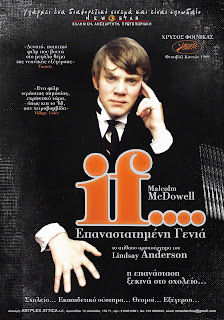Well, color me impressed. Of course I know Malcolm McDowell primarily for A Clockwork Orange, which I love, but this earlier film almost makes that one look tame. Think One Flew Over The Cuckoo's Nest by way of Stalky & Co., with a dash of Lord of the Flies. There's not exactly much of a plot, and there are occasions when it devolves into surrealism, which I don't appreciate, given how realistic the vast majority of the film is (because once you've seen one patent absurdity, like a vicar being produced out of a giant drawer in the headmaster's study, you question everything else in the film), but other than that, it's a rendition of public (i.e. private) school life that's shockingly matter-of-fact about its casual brutalities and rampant homosexuality. I honestly can't believe this film was made in 1968: most of the films that I used to watch on Channel 4 in the 80s were pretty much pale copies. And, as with Clockwork Orange, in watching this you can't understand why McDowell didn't become the biggest star in the world. He is (a) beautiful, and (b) just the most magnetic screen presence imaginable.
Actually, pretty much everyone acquits themselves well in this film (the film is stuffed with faces that will be familiar to anyone who watched British telly in the seventies, even if the only one I can put a name to is Arthur Lowe), although nobody else leaps off the screen like he does. The one thing that dates the film a little is its attitude to women. You could say that a progressive attitude towards women would not be representative of the culture that the film is effectively savaging, but, as I said, the attitude toward homosexual love (one pair of boys, one older, one younger, in particular) is much more forward-thinking. There are a couple of moments of female nudity that are part of the surrealism I objected to earlier, and as such, came across as a bit gratuitous. But maybe that's because I don't have an artistic soul. There is also, of course, a lot of killing at the end - the film is notorious for ending with the heroes camped on the roof of the school shooting everyone,
something that seems a lot more real and more simply murderous than rebellious these days. But McDowell makes us care for Alex DeLarge, and he does the same for this film's Mick Travis.
Part of what the film does is it presents a fly-on-the-wall overview of a term or two at "College House" at a very prestigious school (apparently it was filmed at director Lindsay Anderson's own old school, which, on this showing, he loathed with a passion). The film opens with the first day, and we loosely follow on new student
as he is taught the ways of school - whom you are allowed to talk to (not the "whips" the name in this school for the prefects), where you as a lowly first year (or "scum" - thankfully they don't use the Stalky & Co. lingo of "fag") have to store your gear (in a common room called "the sweat room") and so on. But it isn't long before a mysterious figure, most of his face covered with hat and scarf, enters the school carrying his trunk. This is the returning Mick Travis, and his face is covered, we soon see, because he has grown a mustache over the break, which he knows he has to shave off before school starts.
("When do we get to live?" he murmurs as he does so.) His two acolytes (Johnny and Wallace, the latter of whom is a pretty boy who will end up in bed with a younger boy who falls for him
(and who joins them on the roof at the end)) soon join him and we have the threesome that forms the center of the film
(except on the occasion that just Mick and Johnny go into town (starting handcuffed together for a reason that is unexplained, except possibly as a reference to The Defiant Ones) steal a motorbike from a showroom (charmingly, they're all BSAs - occasionally you are jolted into the fact that this was filmed in the 60s), vroom off to a transport cafe in the middle of the country, where Mick and the waitress
(who also joins them on the roof at the end) act like animals and then roll around naked (did this really happen or is this one of those surrealistic moments?) while Johnny sits demurely by, thoughtfully placing a saucer on top of Mick's coffee to keep it warm. There is a "fly on the wall" aspect to all this, and you never get the feeling you get inside the heads of the characters, even as we watch our three buddies drink and talk about their hopes and philosophies in their study that is papered with all kinds of pictures cut from magazines (mostly nude women and soldiers, but Che and Lenin also make an appearance). Mick spouts nonsense about violence being pure or some such and they talk about the worst ways to die. Mick suggests being flayed alive, and notes that that was how the Crusaders killed their enemies, sending the "neatly folded" skin back to their relatives. (Tellingly, the film was originally called "Crusaders" and in the credits, our heroes are referred to as such.) Meanwhile Johnny says cancer and quietly reveals that his mother took 6 months to die of it, a fact that is just left out there without a response. Things come to a head when the whips decide that the Crusaders need bringing to heel and thrash them, Johnny and Wallace just 4 times, but Mick around ten, at which point the die is cast and we race towards the shootout on the roof.
I can't really explain what makes the film so gripping - as I have indicated, it's very picaresque, and on paper might be thought to have a lot in common with Godard's (frankly rather tedious) Weekend. But the sheer quality of the film-making and McDowell's central performance elevate it. It helps that it's absolutely beautiful. It does cut between color and black and white, but is mostly color, and the cinematographer is the same (Czech) one as the famously gorgeous Amadeus. Watch it - for my money it's much better than, and far less dated than another film centered around a disturbed Travis, Taxi Driver. McDowell > De Niro all day!






































